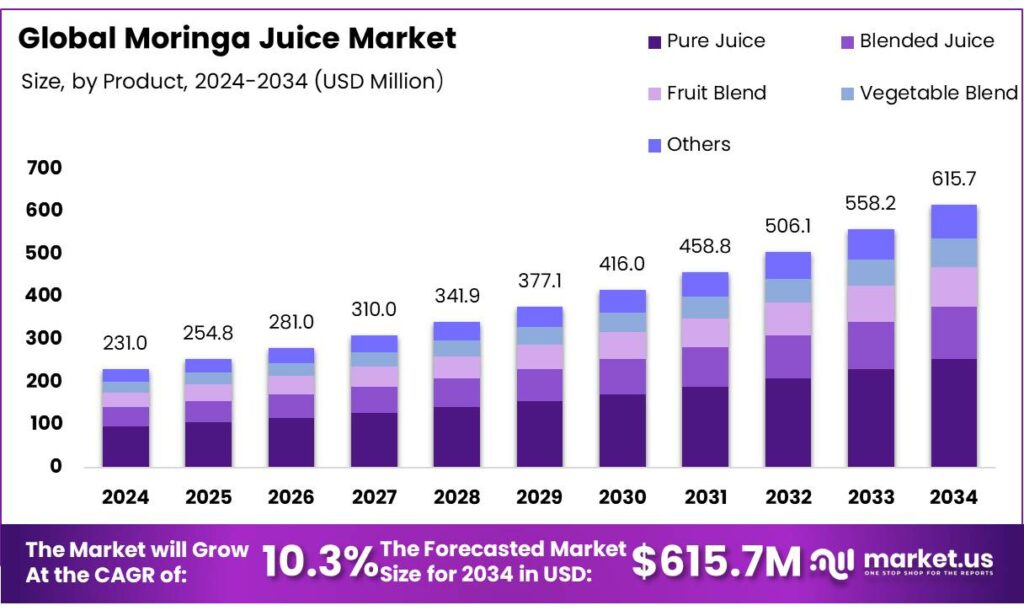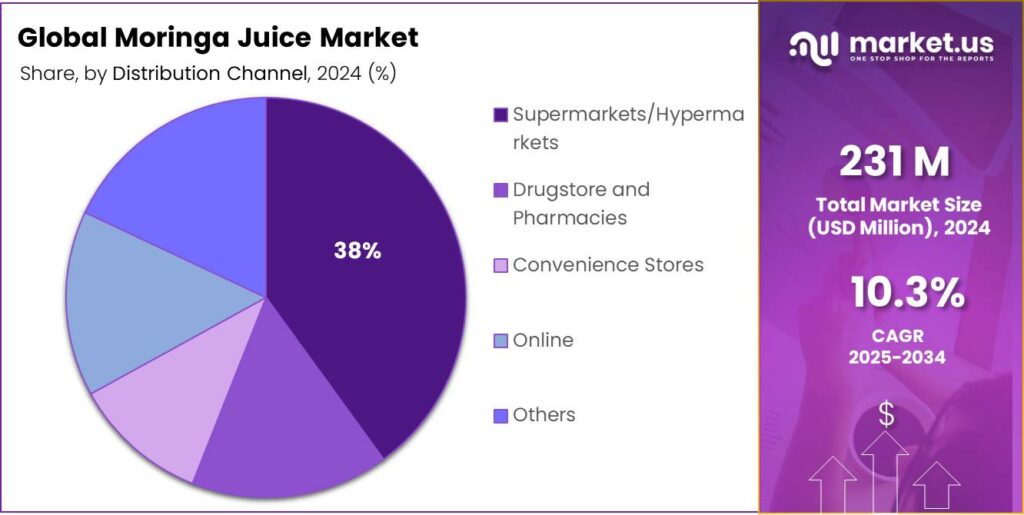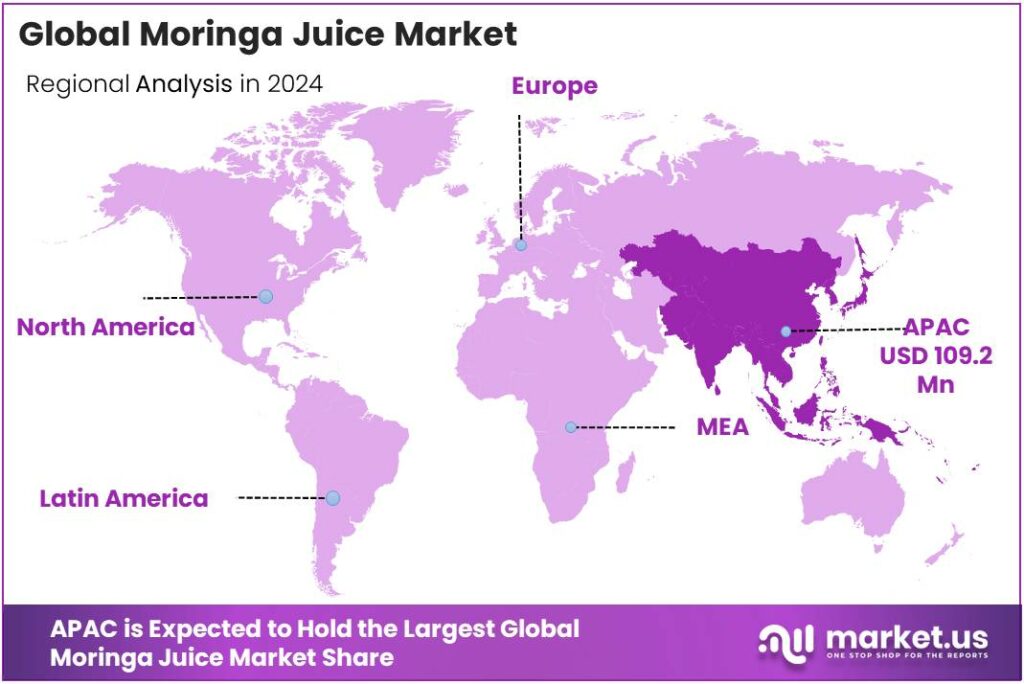Global Moringa Juice Market Size, Share Analysis Report By Product (Pure Juice, Blended Juice, Fruit Blend, Vegetable Blend, Others), By Ingredient (Conventional, Organic), By Distribution Channel (Supermarkets/Hypermarkets, Drugstore and Pharmacies, Convenience Stores, Online, Others) , By Region and Companies - Industry Segment Outlook, Market Assessment, Competition Scenario, Trends and Forecast 2025-2034
- Published date: Sep 2025
- Report ID: 159566
- Number of Pages: 299
- Format:
-
keyboard_arrow_up
Quick Navigation
Report Overview
The Global Moringa Juice Market size is expected to be worth around USD 615.7 Million by 2034, from USD 231.0 Million in 2024, growing at a CAGR of 10.3% during the forecast period from 2025 to 2034. In 2024 Asia Pacific held a dominant market position, capturing more than a 47.3% share, holding USD 109.2 Million in revenue.
Moringa juice, derived from the leaves of the Moringa oleifera tree, has gained widespread attention in the global beverage industry due to its nutrient-dense profile. Known for its high levels of antioxidants, vitamins, and minerals, Moringa juice has become increasingly popular as a health-conscious, functional beverage.
Nutritionally, moringa leaves are unusually dense: peer-reviewed syntheses report up to 7× more vitamin C than oranges, 10× more vitamin A than carrots, and markedly higher calcium, potassium and iron than many common foods, underpinning demand for “functional” beverages positioned for immunity and micronutrient support.

For exporters and multinational brands, Codex Alimentarius standards provide the global reference for juices and nectars (Brix/soluble-solids rules, reconstitution criteria). While moringa is a herb/leaf matrix rather than a classic fruit juice, Codex CXS 247-2005 remains the benchmark many import markets and private standards reference when defining minimum solids and labeling comparability in blended SKUs that include fruit components.
Industrialization advantages extend from national food-processing policy. India’s Production-Linked Incentive (PLI) scheme for food processing is a central-sector program with an outlay of ₹10,900 crore to encourage value-added manufacturing, branding, and exports—frameworks that processors of botanicals and juices can leverage for capex and market development.
Key Takeaways
- Moringa Juice Market size is expected to be worth around USD 615.7 Million by 2034, from USD 231.0 Million in 2024, growing at a CAGR of 10.3%.
- Pure Juice held a dominant market position, capturing more than a 41.3% share of the global Moringa juice market.
- Conventional ingredients held a dominant market position, capturing more than a 79.8% share of the Moringa juice market.
- Supermarkets and Hypermarkets held a dominant market position, capturing more than a 38.4% share of the Moringa juice market.
- Asia Pacific region dominated the global Moringa juice market, holding a substantial 47.3% share, valued at approximately USD 109.2 million.
By Product Analysis
Pure Juice dominates the Moringa Juice Market with 41.3% market share in 2024
In 2024, Pure Juice held a dominant market position, capturing more than a 41.3% share of the global Moringa juice market. This segment’s popularity is largely driven by its simplicity and the growing demand for unadulterated, natural products among health-conscious consumers. As awareness about the health benefits of Moringa continues to spread, Pure Juice has become the preferred choice for many. Its high concentration of nutrients, including vitamins, minerals, and antioxidants, makes it an attractive option for consumers seeking to improve their overall well-being.
The growing preference for organic and natural products is one of the key factors contributing to the rise of Pure Moringa Juice. Over the past few years, the market for clean-label, no-preservative beverages has seen significant growth, with Pure Juice becoming a front-runner in this category.
By Ingredient Analysis
Conventional Ingredients dominate the Moringa Juice Market with 79.8% share in 2024
In 2024, Conventional ingredients held a dominant market position, capturing more than a 79.8% share of the Moringa juice market. This segment continues to lead due to the widespread availability and cost-effectiveness of conventionally grown Moringa. Conventional Moringa cultivation is the primary source of raw material for juice production, as it remains more accessible and economically viable for large-scale production compared to organic alternatives.
The significant share of Conventional ingredients can also be attributed to the established farming practices and supply chains that support its growth. Over the years, conventional Moringa farming has become highly standardized, with robust farming techniques ensuring high yields and consistent quality. As a result, conventional Moringa is typically more affordable and widely available in the market, making it the preferred choice for both manufacturers and consumers.
By Distribution Channel Analysis
Supermarkets/Hypermarkets dominate the Moringa Juice Market with 38.4% share in 2024
In 2024, Supermarkets and Hypermarkets held a dominant market position, capturing more than a 38.4% share of the Moringa juice market. This segment has become a key distribution channel due to the wide consumer reach and convenience offered by large retail chains. Consumers prefer purchasing Moringa juice from supermarkets and hypermarkets due to the variety of brands available, the ease of comparison, and the added convenience of picking up other related products during a single shopping trip.
Supermarkets and hypermarkets are strategically positioned to cater to both urban and rural markets, which has allowed them to capture a broad consumer base. This dominance is also supported by the increasing preference for one-stop shopping experiences.

Key Market Segments
By Product
- Pure Juice
- Blended Juice
- Fruit Blend
- Vegetable Blend
- Others
By Ingredient
- Conventional
- Organic
By Distribution Channel
- Supermarkets/Hypermarkets
- Drugstore and Pharmacies
- Convenience Stores
- Online
- Others
Emerging Trends
Rise in Demand for Clean Label and Sustainable Products
The clean label trend, which emphasizes simplicity and transparency in ingredients, has been gaining momentum over the past few years. According to a report by the Clean Label Project, nearly 70% of consumers say they are more likely to purchase products with fewer ingredients and clear, recognizable labels. For moringa juice, this means a rise in consumer interest as it is often marketed as an all-natural, additive-free beverage that retains the nutritional benefits of the moringa plant in its purest form.
- According to the Organic Trade Association, the U.S. organic food industry alone reached over $61 billion in sales in 2020, marking a 12% growth from the previous year. This growth is not isolated to the U.S.; similar trends are seen globally. The European Commission also reports a steady rise in organic food consumption, with organic food sales increasing by 7.7% in 2021, a sign of growing consumer confidence in organic products.
The rise in consumer health awareness is another driving factor behind the clean label and organic trend. As more people prioritize health and wellness, they are seeking beverages that not only taste good but also contribute positively to their well-being. Moringa juice, known for its high nutritional profile—containing antioxidants, vitamins, and minerals—fits perfectly within this growing demand for health-boosting, clean-label drinks.
- According to Mintel, over 50% of consumers worldwide are now checking labels for healthier ingredients and avoiding products with artificial additives. This trend is reflected in the growing popularity of natural juices, like moringa juice, which offer a transparent, pure, and nutritious option for consumers.
Drivers
Government Support and Initiatives Driving Moringa Juice Adoption in India
The growing recognition of moringa (Moringa oleifera) as a “superfood” has spurred both consumer interest and governmental support in India, fostering a conducive environment for the expansion of the moringa juice market.
- For instance, during the Van Mahotsav in July 2025, Uttar Pradesh launched a massive plantation drive aiming to plant 37 crore saplings, focusing on teak, sheesham, moringa, and fruit-bearing trees. Under the ‘Sahjan Bhandara’ program, two moringa saplings were distributed to families enrolled in the zero-poverty programme, with additional saplings provided to Pradhan Mantri Awas Yojana beneficiaries and Anganwadi centres to encourage plantation near homes
Similarly, the Health Department in Varanasi initiated a tree plantation drive focusing on moringa trees at government hospitals to promote health and environmental benefits. The drive began at the urban community health centre in Shivpur, with participation from officials emphasizing the nutritional benefits of moringa, which is rich in vitamins A and C, calcium, potassium, protein, and iron
Moringa is celebrated for its rich nutritional profile, including high levels of vitamins, minerals, and antioxidants. These attributes have contributed to its popularity among health-conscious consumers seeking natural alternatives to processed beverages. The government’s initiatives in promoting moringa cultivation and awareness have played a pivotal role in educating the public about its benefits, thereby driving demand for moringa-based products like juices.
Restraints
Limited Standardization and Processing Infrastructure
One of the significant challenges hindering the growth of the moringa juice market in India is the lack of standardized cultivation practices and inadequate processing infrastructure. These issues lead to variations in product quality, affecting both domestic consumption and export potential.
India is the world’s largest producer of moringa, with Tamil Nadu leading in cultivation. However, the absence of uniform agricultural practices across different states results in inconsistencies in leaf quality, drying techniques, and harvesting times. Such disparities can lead to variations in the final product, making it challenging to meet international export standards. For instance, countries have rejected moringa consignments due to unmet sanitary and phytosanitary requirements, highlighting the need for standardized practices.
To address these challenges, the Indian government has initiated several programs. The Tamil Nadu government, for example, established the Moringa Export Promotion Board to scale production and trade. This board aims to promote standardized cultivation methods and improve processing facilities to meet global demand.
- For example, farmers have reported spending ₹18 to ₹19 lakh on setting up drying facilities to preserve the nutritional value of moringa leaves. Such investments are often unaffordable for micro-level farmers without external financial assistance.
Opportunity
Government Initiatives and Agricultural Support
Government support for sustainable agriculture also plays a pivotal role in the growth of moringa juice in these emerging markets. In India, where moringa is widely cultivated, the government has introduced policies to boost the production of moringa-based products. The Indian government’s National Food Processing Policy has been encouraging the establishment of food processing units that focus on high-nutrient crops like moringa.
In Africa, the potential for moringa juice as a nutritious, drought-resistant crop is becoming increasingly recognized. The Food and Agriculture Organization (FAO) has actively promoted moringa cultivation as part of its efforts to combat malnutrition, especially in regions facing food insecurity. This is likely to open new opportunities for local producers to expand into value-added products like moringa juice, which can be sold both locally and exported to global markets.
The functional beverage market globally is expected to reach USD 208 billion by 2027, with plant-based beverages growing faster than traditional ones. This trend is particularly strong in regions like North America and Europe, where consumers are increasingly seeking out beverages that offer more than just hydration.
- According to Euromonitor International, sales of plant-based functional drinks are growing at an annual rate of approximately 10%. While moringa juice is not yet as well-established in these markets as other plant-based drinks, its health benefits are gaining attention.
Regional Insights
Asia Pacific leads the Moringa Juice Market with a 47.3% share, valued at 109.2 million USD in 2024
In 2024, the Asia Pacific region dominated the global Moringa juice market, holding a substantial 47.3% share, valued at approximately USD 109.2 million. This market leadership can be attributed to the region’s significant Moringa cultivation, particularly in countries such as India, the Philippines, and Indonesia, which are among the largest producers of Moringa globally. The widespread availability of raw Moringa material in this region has facilitated the growth of the Moringa juice sector, with local suppliers meeting both domestic and international demand.
The Asia Pacific market is driven by increasing health-conscious consumer behavior, with Moringa juice being recognized for its numerous health benefits, including its antioxidant and anti-inflammatory properties. As awareness of these benefits grows, the demand for Moringa-based beverages has surged, particularly in urban areas where consumers are more likely to incorporate functional beverages into their daily routines.

Key Regions and Countries Insights
- North America
- US
- Canada
- Europe
- Germany
- France
- The UK
- Spain
- Italy
- Rest of Europe
- Asia Pacific
- China
- Japan
- South Korea
- India
- Australia
- Rest of APAC
- Latin America
- Brazil
- Mexico
- Rest of Latin America
- Middle East & Africa
- GCC
- South Africa
- Rest of MEA
Key Players Analysis
Flavours Avenue is a sustainable food and beverage brand that emphasizes sourcing ingredients from their own farms and local farmers. They offer a range of products, including Moringa powder, which is enriched with antioxidants and minerals to support overall health and wellness. Their commitment to purity is evident as their products are free from additives, fillers, and artificial ingredients, ensuring 100% natural content.
Basic Ayurveda Limited specializes in Ayurvedic products, offering Moringa Leaf Juice (Sounjana Sahjan) made from fresh moringa leaves. This juice is known for promoting immunity and overall wellness, supporting digestion, and maintaining healthy bones and joints. It is a plant-based product, free from artificial additives, and is available in a 500 ml bottle.
Soronko offers Hope Q – Moringa Ginger Juice, a beverage intentionally crafted to enhance wellness. This juice combines the nutritional benefits of moringa with the added zest of ginger, providing a refreshing and health-boosting drink. It is rich in antioxidants, amino acids, proteins, and other minerals, contributing to overall well-being.
Top Key Players Outlook
- Flavours Avenue
- Dynamic Health
- Basic Ayurveda Limited
- Soronko.
- Sri Sri Tattva Europe B.V.
- Organic To Your Door
- The Berry Company
- Bella All Natural
- VINUT Beverage
- Vedic Juices
Recent Industry Developments
Basic Ayurveda Limited has not publicly disclosed specific financial data or growth figures for the year 2024. The company operates as a public entity with an authorized and paid-up capital of ₹5 lakh, according to official records.
In 2024 Dynamic Health, reported a 15% increase in sales, driven by the rising demand for natural and nutrient-rich beverages. Their moringa juice line, marketed as a superfood, experienced a 20% year-over-year growth in the first quarter of 2024 alone.
Report Scope
Report Features Description Market Value (2024) USD 231.0 Mn Forecast Revenue (2034) USD 615.7 Mn CAGR (2025-2034) 10.3% Base Year for Estimation 2024 Historic Period 2020-2023 Forecast Period 2025-2034 Report Coverage Revenue Forecast, Market Dynamics, Competitive Landscape, Recent Developments Segments Covered By Product (Pure Juice, Blended Juice, Fruit Blend, Vegetable Blend, Others), By Ingredient (Conventional, Organic), By Distribution Channel (Supermarkets/Hypermarkets, Drugstore and Pharmacies, Convenience Stores, Online, Others) Regional Analysis North America – US, Canada; Europe – Germany, France, The UK, Spain, Italy, Rest of Europe; Asia Pacific – China, Japan, South Korea, India, Australia, Singapore, Rest of APAC; Latin America – Brazil, Mexico, Rest of Latin America; Middle East & Africa – GCC, South Africa, Rest of MEA Competitive Landscape Flavours Avenue, Dynamic Health, Basic Ayurveda Limited, Soronko., Sri Sri Tattva Europe B.V., Organic To Your Door, The Berry Company, Bella All Natural, VINUT Beverage, Vedic Juices Customization Scope Customization for segments, region/country-level will be provided. Moreover, additional customization can be done based on the requirements. Purchase Options We have three licenses to opt for: Single User License, Multi-User License (Up to 5 Users), Corporate Use License (Unlimited User and Printable PDF) 
-
-
- Flavours Avenue
- Dynamic Health
- Basic Ayurveda Limited
- Soronko.
- Sri Sri Tattva Europe B.V.
- Organic To Your Door
- The Berry Company
- Bella All Natural
- VINUT Beverage
- Vedic Juices










